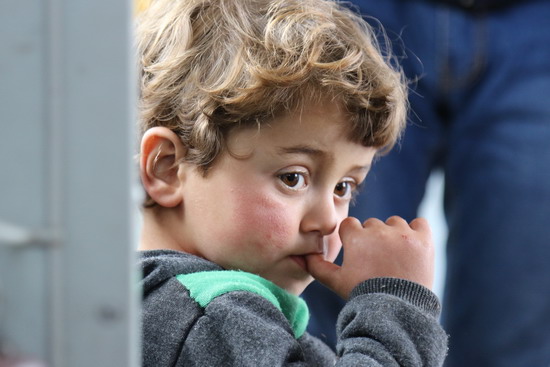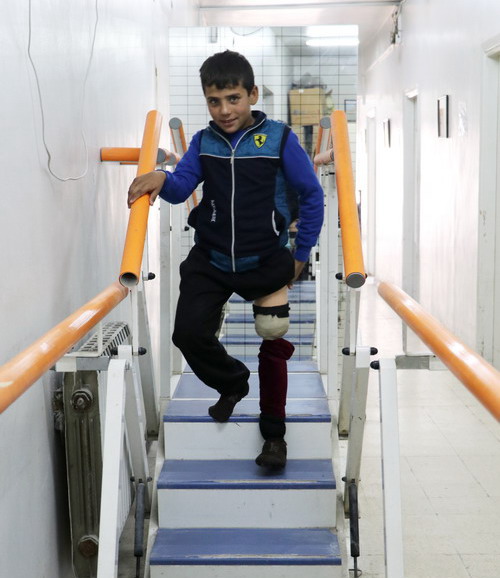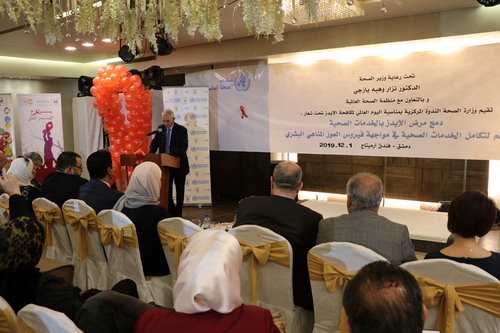 3 February 2020, Geneva-Cairo-Copenhagen – The World Health Organization raises alarm over critical health threats facing hundreds of thousands of Syrians forced to flee due to intensified hostilities in northwest Syria and attacks on health care.
3 February 2020, Geneva-Cairo-Copenhagen – The World Health Organization raises alarm over critical health threats facing hundreds of thousands of Syrians forced to flee due to intensified hostilities in northwest Syria and attacks on health care.
Fighting in Idleb governorate, the last area in the country under opposition-control, has intensified in recent weeks and past days have seen unprecedented mass displacement. Since 1 December more than half a million people or nearly 520 000, are thought to have fled the violence. On average, WHO and its partners reach 800 000 people in northwest Syria every month – but the situation on the ground is changing by the hour.
As of 31 January, at least 53 health facilities had suspended services since 1 January due to insecurity, threats of attacks or the simple fact that entire areas have been deserted by civilians seeking refuge from violence and daily bombardments.
What this means to Syrian families on the run is further limited access to basic health care, an increasing lack of basic medicine and less protection against communicable diseases as a fragile immunization network, put in place by WHO and partners, is now disrupted – coinciding with a mass displacement, further increasing the risk of outbreaks.
“To fill the gap created by closed health facilities; we are revising our referral network, trying to sustain stocks of life-saving medicine for those with non-communicable diseases and supporting the relocation of some of the health facilities. Prepositioned on both sides of the Syria/Turkey border, we have a 2-month supply of essential medicine – but in the light of the extent of the crisis, we fear the demand will be far greater than the supply,” said Rick Brennan, regional emergency director.
WHO is also increasing the number of mobile clinics that can follow the movements of the displaced and are less likely to be attacked. So far in 2020, 2 separate attacks on health care have been verified; both of them in the northwest, claiming 10 lives and injuring 30.
“The current situation in northwest Syria – characterized by lack of access and medicine, insufficient hygiene, chaos and mass displacement - poses a significant risk of outbreaks of measles, diarrhoeal diseases and other diseases,” said Brennan.
“What is striking about this escalation is that the enormous humanitarian needs are being largely ignored by the international media and governments. Northwest Syria represents one of the world’s most severe humanitarian crises, where civilians are suffering on an extraordinary level. Humanitarian agencies can only do so much. What we need is a renewed international commitment to bring an end to this protracted and devastating crisis,” said Brennan.
An estimated 2.9 million people in Syria’s northwest are in need of health care.
For further information:
Inas Hamam
Communication Officer
This e-mail address is being protected from spambots. You need JavaScript enabled to view it
tel. + 201000157385
Hedinn Halldorsson
Communication Officer
This e-mail address is being protected from spambots. You need JavaScript enabled to view it
tel. + 90 538 544 29 57





 17 December 2019, Damascus, Syria – In the crowded reception area of the Disability and Physical Rehabilitation Centre in Damascus, 13-year old Ali from Ar-Raqqa governorate waits for his name to be called. His father Jaseem waits patiently with him, optimistic that his son will receive the best possible treatment. Ali was injured during a bombardment of his area of Ein Issa city in north-east Syria two years ago while helping his father in their small shop. Shrapnel hit his leg and he was rushed to hospital, where doctors had no choice but to amputate his leg above the knee. Since then, he has been fitted with a series of artificial left legs to accommodate his growing body.
17 December 2019, Damascus, Syria – In the crowded reception area of the Disability and Physical Rehabilitation Centre in Damascus, 13-year old Ali from Ar-Raqqa governorate waits for his name to be called. His father Jaseem waits patiently with him, optimistic that his son will receive the best possible treatment. Ali was injured during a bombardment of his area of Ein Issa city in north-east Syria two years ago while helping his father in their small shop. Shrapnel hit his leg and he was rushed to hospital, where doctors had no choice but to amputate his leg above the knee. Since then, he has been fitted with a series of artificial left legs to accommodate his growing body.
